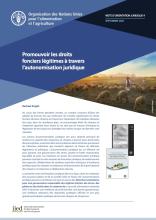Land Library
Welcome to the Land Portal Library. Explore our vast collection of open-access resources (over 74,000) including reports, journal articles, research papers, peer-reviewed publications, legal documents, videos and much more.
/ library resources
Showing items 1 through 9 of 11.Au cours des trente dernières années, un nombre croissant d'États ont adopté de bonnes lois qui renforcent considérablement les droits fonciers de leurs citoyens.
Cameroon’s current land law appears to have two conflicting objectives: to attract investors through large-scale land concessions while simultaneously protecting biodiversity, defending local people’s rights and promoting rural development.
This article reflects on the Tenure Guidelines as a tool for addressing resource governance challenges.
An analysis paper by Future Directions International on livelihood considerations and food security in the Lower Mekong countries, published in May 2016.
An analysis paper by Dustin Hoasa on the World Bank Group's lending practices, part 2 in Inclusive Development International (IDI)'s 'Outsourcing Development' series.
This report draws on 10 case studies of recent large-scale land deals and aims to improve understanding of the investment chains that underpin the deals, and to identify ‘pressure points’ for effective public action to ensure that investments respond to local and national development agendas and
The Myanmar government introduced two new land laws in 2012 as part of an effort to liberalize land markets. This report analyzes the implementation of these laws using theory, field research, and a comparative regional analysis. It also offers recommended interventions.
This guide offers a three-point framework for companies seeking to integrate FPIC principles into their policies and apply them in the operations. This includes
• complying with the requirements for FPIC under international and national law,
This paper describes the interventions undertaken in the Doe Mao Salong watershed in an effort to restore the landscape and improve the livelihoods of local communities.






